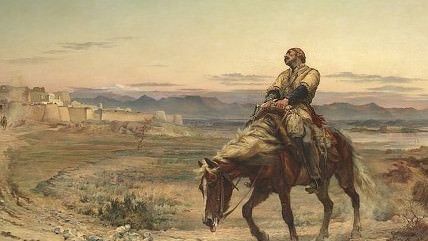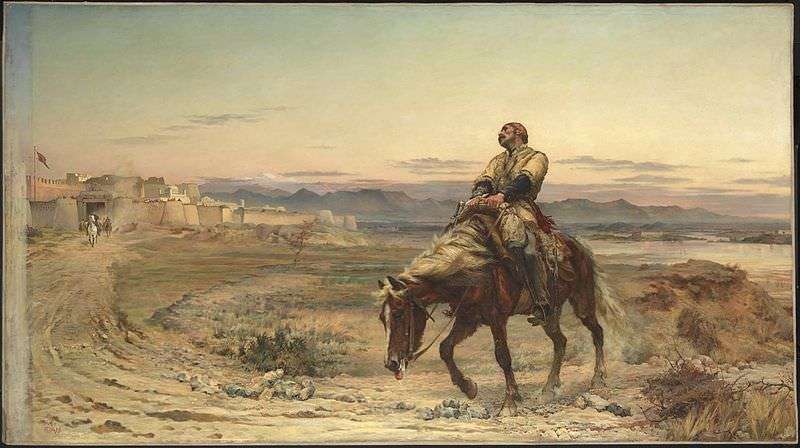Are There Lessons We Can Learn From the First Anglo-Afghan War?


Last Monday was the 172nd anniversary of William Brydon's arrival at Jalalabad. Brydon, who served as an assistant surgeon in the British East India Company Army, was (so the legend goes) the only survivor of one of the worst defeats in British military history, the retreat from Kabul to Jalalabad during the First Anglo-Afghan War. Thousands of British troops and civilians who followed their camp were either picked off or captured by tribesmen or succumbed to the the winter conditions as they traveled.
Brydon arrived in Jalalabad on a weak horse with a slashed skull on Jan. 13 1842 and said, "I am the army." when asked where his comrades were.
The story of the British retreat from Kabul is only one of the many tales that make up part of the "Afghanistan is where empires go to die" rhetoric that is sometimes heard in discussions about the current war in Afghanistan.
In September 2009, Dahr Jamail wrote in Global Research that,
The United States Empire is following a long line of empires and conquerors that have met their end in Afghanistan. The Median and Persian Empires, Alexander the Great, the Seleucids, the Indo-Greeks, Turks, Mongols, British and Soviets all met the end of their ambitions in Afghanistan.
As Seth Jones at the RAND Corporation pointed out in a review of William Dalrymple's Return of a King: The Battle for Afghanistan, 1839–42, "Massive social and political changes in Afghanistan make it thorny to pull many lessons from the first Anglo-Afghan war."
That said, Afghanistan is proving a difficult place for the U.S.-led forces to manage. NPR recently reported that despite billions of dollars being spent on stopping opium production Afghanistan could still become a "narco-criminal state," and today the BBC reported that while it is unlikely that the Taliban are in a position to retake control of the country now it is possible that the election of a weak president could prompt the sort of takeover seen in 1996.
Editor's Note: As of February 29, 2024, commenting privileges on reason.com posts are limited to Reason Plus subscribers. Past commenters are grandfathered in for a temporary period. Subscribe here to preserve your ability to comment. Your Reason Plus subscription also gives you an ad-free version of reason.com, along with full access to the digital edition and archives of Reason magazine. We request that comments be civil and on-topic. We do not moderate or assume any responsibility for comments, which are owned by the readers who post them. Comments do not represent the views of reason.com or Reason Foundation. We reserve the right to delete any comment and ban commenters for any reason at any time. Comments may only be edited within 5 minutes of posting. Report abuses.
Please to post comments


Something about a land war in Asia?
Wasn't the first Anglo-Afgan war like 2500 years ago?
Anglo? You're thinking Greeks/Macedonians, I assume. Now there's an argument with half of the Parthenon sitting in London that England has a claim on Athens, but I think it might be stretching a point.
Alexander had blond hair.
I assume it is because he is Germanic....Anglos are Germanic as well.
http://en.wikipedia.org/wiki/S.....h_soldiers
"When you're wounded and left on Afghanistan's plains,
And the women come out to cut up what remains,
Jest roll to your rifle and blow out your brains,
An' go to your Gawd like a soldier."
? Rudyard Kipling, "The Young British Soldier"
No Flashman references? Every one of you disgusts me.
When I read the first Flashman book it was all fun and laughs, cocktails and fornication - until he got to Afghanistan.
I kept referring to the amazing footnotes and endnotes George MacDonald Fraser kept in all his books (many details from firsthand sources). It was hard to believe how it went down.
Helluva thread for Elspeth to go missing on.
Elphinstone, the British Commanding General, is a strong contender for the title of "most incompetent military commander ever". The British plan was ill-advised, but Elphinstone and the diplomatic crew sent along with him, fucked it up by the numbers. A simple insurrection that could been halted by simply marching out the Infantry turned into a slaughter as Elphinstone did absolutely everything wrong.
The lesson is - don't send an incompetent old coward to lead a campaign.
Read the original "Flashman" novel for the some of the awful details.
One quibble with Dahr Jamail's quote: Alexander the Great made it through what is now Afghanistan and all the way to the Indus Valley before turning around because his troops decided they had had enough of "military tourism." The proto-Afghanis had nothing to do with it.
I just read a good history of his conquests, and he had some trouble with tribes in the region, but he subdued the shit out of them. He left because his troops were tired of the whole business. India's rain and disease didn't help, either.
The Persian Empire (at least the first one) held it for several centuries. They met the end of their ambitions at the hands of Alexander.
The second Persian Empire took it back pretty quickly, as well. Almost everyone in Afghanistan speaks Farsi in addition to their various and unrelated local languages.
A great read, by the way
http://www.gutenberg.org/files.....9404-h.htm
Churchill, in Afghanistan in 1892
Dude can write. his assessment of the Pashtun tribesmen =
"a continual state of feud and strife prevails throughout the land... To the quarrels of communities are added the combats of individuals... Every tribesman has a blood feud with his neighbor. Every man's hand is against the other, and all against the stranger.
... To the ferocity of the Zulu are added the craft of the Redskin and the marksmanship of the Boer. The world is presented with that grim spectacle, "the strength of civilisation without its mercy.".... The weapons of the nineteenth century are in the hands of the savages of the Stone Age. ...Every influence, every motive, that provokes the spirit of murder among men, impels these mountaineers to deeds of treachery and violence. The strong aboriginal propensity to kill, inherit in all human beings, has in these valleys been preserved in unexampled strength and vigour. That religion, which above all others was founded and propagated by the sword?the tenets and principles of which are instinct with incentives to slaughter and which in three continents has produced fighting breeds of men?stimulates a wild and merciless fanaticism...."
oh, Winston: White Privilege! Don't be so hard on them.
That any are left alive after hundreds of years of feuds sorta puts a lie to that old "Eye for an Eye and soon the whole world is blind" bumper sticker.
He sort of explains that too. The more you read of that piece, BTW, the more you go, "gee, that really sounds like Afghanistan today!"
The population of Afghanistan is largely under 40, and a lot missing eyes . . .